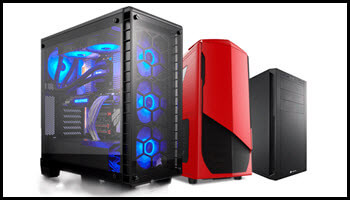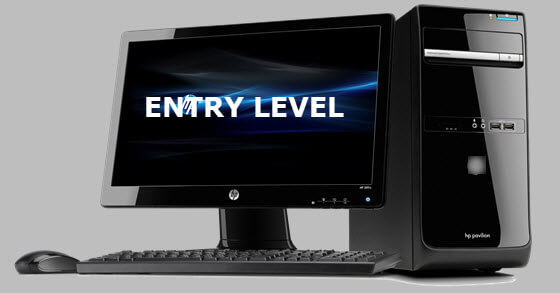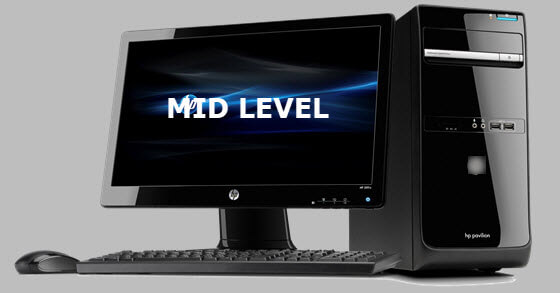Thinking of buying a new PC and uncertain of exactly what hardware specs you need? In this article, I’ll do my best to steer you in the right direction.
I last wrote about this topic back in 2016, but it was brought to light again recently when a client asked for advice on buying a new PC. Things have changed quite a bit since 2016 so I thought it might be a good idea to revisit this important topic. Obviously, which PC is best for whom depends largely on budget and how the computer is going to be utilized. I’m leaving gamers and advanced users out of the equation because they generally know exactly what they want/need so we’ll be concentrating here on your average home users.
I’m going to begin with a number of points that apply across the board:
- Do not buy a new computer that isn’t equipped with at least a 250 GB SSD as minimum
- I was once an Intel man through and through but, since the release of its Ryzen series of processors, I believe AMD has all but levelled the playing field
- Do not buy a new PC with Windows 10 pre-installed. And, if you are tempted by a super cheap price tag, make thoroughly sure that it can be upgraded to Windows 11 (read this: Buyer Beware)
- In my opinion, neither the Intel i3 series nor Ryzen 3 series processors represent good value for money
First off, it’s always best practice to buy a PC with slightly higher specs than you think you might need. A new PC with a pristine operating system installed will always perform well, even low-end PCs, but in 6- 12 months’ time a low-end PC will end up running like molasses and you’ll be wishing you had bought a better machine. Everyone works to a budget, of course, but buying a new PC purely on price can end up being a false economy.
- You also might like: Everything You Should Know When Buying a UPS
Entry-Level Computers
As the name suggests, entry-level computers are primarily aimed at novice users and, while entry-level-type machines are typically designed and priced for basic computer needs, it’s still important that they perform these functions adequately. For those with basic computing requirements entry-level machines are eminently suitable and can generally be purchased at a very reasonable price. There’s not much point in paying a premium for high-end specs which are never going to come into play:
Suggested Minimum Specs:
- CPU: Intel i5 series or Ryzen 5 series
- RAM: 8 GB
- Graphics: Integrated
- System Drive: 250 GB SSD
- PSU: 350-450w 80+ rated
Mid-Level Computers
These machines are suitable for almost all users except for those with specialist requirements, such as gamers, graphics designers, etc. Mid-level machines are what I have always built for my own use and I work quite a bit with video encoding and editing as well as with basic graphics. This is a complex level in which I’ll include a couple of additional recommendations, budget permitting:
Suggested Minimum Specs:
- CPU: Intel i5 series or Ryzen 5 series. Go to an Intel i7 or Ryzen 7 if the budget permits
- RAM: 16 GB
- Graphics: See note under*
- System Drive: 500 GB SSD. Preferably an NVMe SSD, if the budget allows
- Secondary Drive: 1 TB HDD- primarily for data storage
- PSU: 450-550w 80+ rated. Will obviously need to be upgraded if a GPU is included
*NOTE: Deciding whether to go with a dedicated graphics card or not is a tricky one. GPUs are expensive and integrated graphics have improved enormously in recent times. Most will not need a dedicated graphics card, but you need to make sure the CPU supports the latest integrated graphics. A GPU is required for complex games with high-end graphics but today’s machines with integrated graphics and increased RAM will easily handle simpler games. None of my three machines include a dedicated graphics card and, as I mentioned earlier, I work a lot with encoding video and manipulating images.
BOTTOM LINE:
When looking to buy a new computer, there are so many different hardware configurations, it’s often quite difficult to know where to begin. What I have recommended here are the minimum requirements for critical components and I hope it goes some way to helping you make the right choice.
If you have any questions, please feel free to ask away via the comments.
—



G’Day Jim,
Though I’m still running Win 7 Pro (on a now-ancient HP 17″ laptop with 0Patch updates through 2025), I’m looking to purchase a contemporary 17″ laptop with modern hardware — and one that is much better designed & constructed: the keyboard is failing, it maxes-out at 16 GB RAM, and it has always run hot, even with additional cooling (I am not a gamer; only some video transcoding).
Your point is well taken, but as I am not at all enamored of Win 11, I should like to run Win 10 22H2 Pro (there is an increasing likelihood that 0Patch will be offering extended updates for 22H2 in 2025 for at least two years, if Micro$oft does not), then eventually move to Linux if M$ hasn’t an acceptable OS by that point in time (which it increasingly seems will be the case…).
So, it appears that my choices include a machine with the latest hardware and comes with Win 10 Pro installed, one with Win 11 Pro, which I’d then strip-out and replace with Win 10, or no OS, and then install Win 10.
Your thoughts would be greatly valued (and appreciated).
Hope all is well down your way; take good care!
Cheers,
AJ
G’Day AJ,
I see no problem with your plan. However, I would still recommend going with a machine that definitely supports Win11. Even if you’re not going to run Win11, it will ensure the machine includes the latest hardware/specs. It will also greatly improve resale value down the track.
I am not a huge Linux fan myself but I do get the appeal, just make sure that any specialist software you need is available for Linux.
Cheers mate… Jim